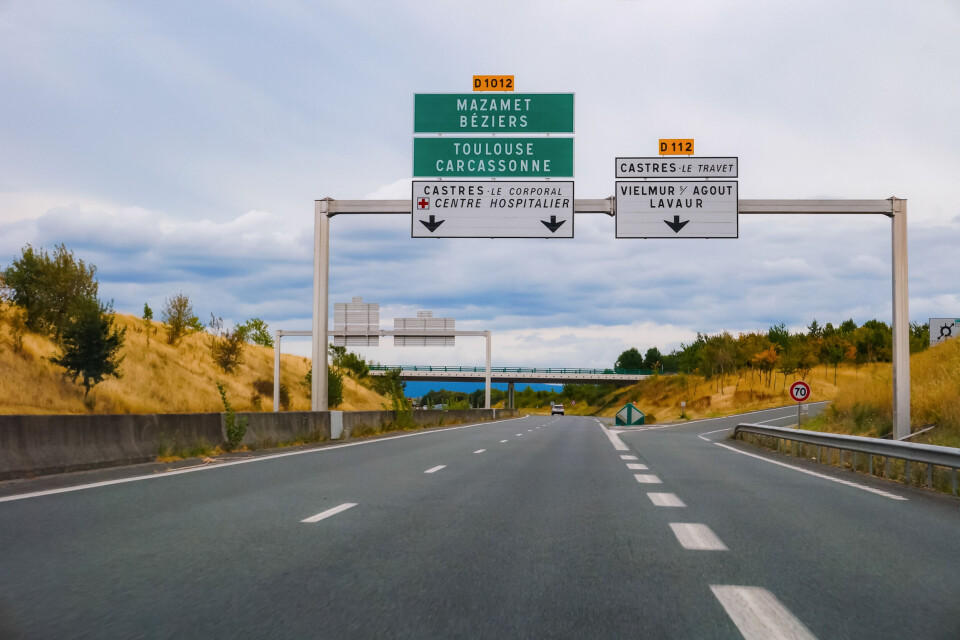-
Before and after: Garonne river floods in south-west France
Satellite images show extent of flooding from back-to-back storms in February
-
Home insurance increases expected in France after floods
Compensation costs for the recent storms and flooding across the west and south-west is estimated to be in the billions of euros
-
La Voie Bleue: European Cycle Route of the Year is in France
700km bike path linking Luxembourg and Lyon has been crowned winner of the 2026 title
Protests against new motorway plan for southwest France
The campaigners say that the plans are ‘anachronistic’ and go against environmental priorities, but proponents say the Occitanie motorway is needed

Environmental protesters have marched against plans for a new motorway in France, with one report calling it “anachronistic”. Supporters say it is crucial for economic development.
The group La Voie est Libre (LVL) organised a march against plans for the future A69 motorway, a 53-kilometre road that is set to link Verfeil near Toulouse (Haute-Garonne), with Castres (Tarn).
The plan for the road came after elected officials worked with the late local director and cosmetic brand founder Pierre Fabre. The proposal aimed to make it quicker to access the regional city, and to develop more economic activity in Castres.
The motorway has been in discussion for 25 years.
After a public debate on the issue in 2009, plans for a motorway route began. The project was declared to be a ‘public utility’ in 2018, and classified as a ‘national priority’ in a transport law the following year.
This year, the project reached a new stage, and a contract between the state and the project owner Atosca was approved by public decree on April 22. Environmental approval is expected in January 2023, and the motorway is scheduled to enter service by the second quarter of 2025.
Protesters march
The LVL group organised a ‘grand march’ against the planned road, along the proposed route. It ended yesterday (October 24).
Aline Guerin, opposition councillor in Castres and LVL spokesperson, told Le Monde: “This action will be decisive in our fight. We will have six months to get organised. Because this project is emblematic of a world that we no longer want, [a world] of cars.”
Another protester, who wanted to remain anonymous, helped to install signs along the Route nationale 126, with messages including “responsibility” in capital letters.
He said: “This project is an ecological aberration. We are destroying 400 hectares of farming land, at a time when we’re dealing with issues of climate change and food supremacy.”
Another protester said that the motorway was “unfair” and would only benefit the richest in society. He said: “Those who have the means will pay €14 to come and go more quickly.”
Detractors of the plans are instead calling for a revamp of the existing national road, which they say has been studied and planned by the consultancy Burotec, and financed by 15 groups opposed to the motorway.
Sabine Mousson, mayor of Teulat (Tarn), and spokesperson for the Collectif des maires de la vallée du Girou, said: “Our alternative is free for users and it will only require 90 hectares of land. It will be a timesaver and cost less. We estimate its budget will be €179million.”
This is in contrast to the €400million sum budgeted for the motorway.
‘Worst of scenarios’
A farmer in the area, Dominique Rougeau, told Le Monde that under the current plans, the motorway will cut through his farming land, which has been in the family since 1959. It will split his crops into two parts, and destroy 7.5 hectares of ground, he claimed.
He said: “There were two possible routes, but this one has been imposed on me. This is the worst of the scenarios envisaged.”
He claims that the motorway will damage his business and infrastructure, as well as his planting activity.
On October 5, l’Autorité environnementale strongly criticised the project.
It said: "This road project, which was started several decades ago, appears anachronistic in view of the current challenges and ambitions for the environment….[and] the socio-economic analysis is based on traffic data and assumptions about polluting emissions that are now obsolete.”
‘The motorway is needed’
Tarn prefect François-Xavier Lauch dismissed the debate, but acknowledged that the plan’s impact on the environment was an important issue.
He said: “The question of whether or not a motorway is needed has been discussed and decided. The question now is to know what impact the project will have on the environment.”
A report on the issue has been prepared by the National Council for Nature Protection (the CNPN, attached to the Ecology Ministry).
On September 12, the council reported an “unfavourable opinion” of the impact study drawn up by Atosca, saying that it shows “numerous shortcomings in terms of measuring the direct and indirect impacts [of the motorway].”
But Pascal Bugis, mayor of Castres and president of the Castres-Mazamet agglomeration, is a strong supporter of the motorway project. He said that the criticism was “catastrophising” the situation.
He said: “We are 80 kilometres from Toulouse, but it takes us 90 minutes to drive. This holds us back. Albi and Montauban are linked to Toulouse by a motorway, and we can’t develop without that infrastructure.”
Atosca response
Project owner Atosca has not disagreed with those who are warning of the environmental impact of the road.
Martial Gerlinger, managing director of the company, said: “We are taking note of the recommendations and are improving our plans.”
He said that the A69 would “rise to the challenges of sustainable, low-carbon transport”, and would include a range of environmentally-friendly measures, including the building of 16 charging stations for electric cars, and 200 “engineering structures” to enable wildlife to cross.
Related articles
What do middle lane motorway drivers risk in France?
Motorway linking France and Spain to go toll-free from September
French PM requests new study into reducing motorway speed to 110km/h
























